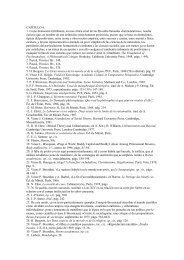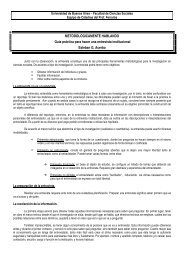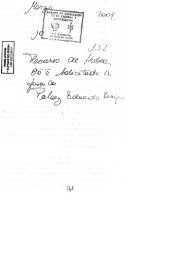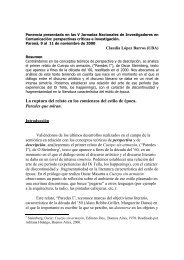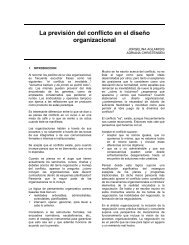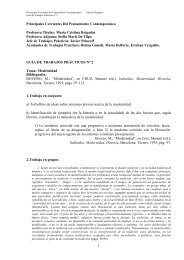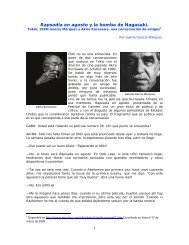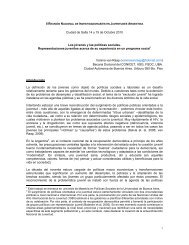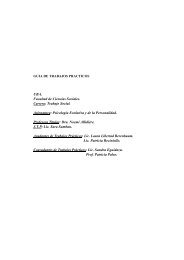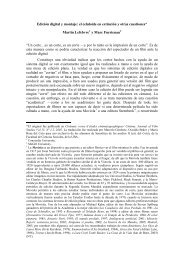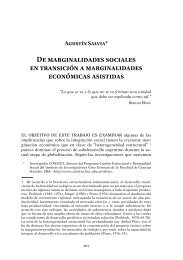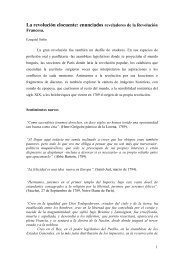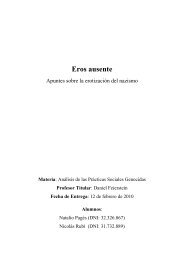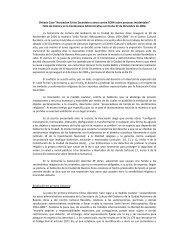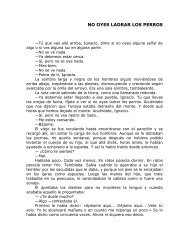Charisma Reconsidered
Charisma Reconsidered
Charisma Reconsidered
Create successful ePaper yourself
Turn your PDF publications into a flip-book with our unique Google optimized e-Paper software.
<strong>Charisma</strong> as a Social Science Concept<br />
Strangely, the reception-history of the concept within the social sciences themselves<br />
presents an entirely different picture. Weber’s portrayal of the charismatic<br />
leader is doubtless the most perfect and well-realized typification in the social<br />
sciences. When Weber says that the charismatic leader is responsible to the ruled in<br />
one thing only, that he personally and actually is the God-willed master, and that<br />
charisma knows only inner determination and inner constraint, that it rests on no<br />
legitimacy other than personal strength that is constantly being proven, he<br />
describes a very precise and unusual phenomenon. His friend and follower Robert<br />
Michels soon found an example – the capo carismatico Mussolini – and<br />
commented:<br />
It is useless, anti-historical and anti-scientific to hope that dictators, having<br />
happily initiated their political work, will abdicate at the height of their<br />
power, since abdication is an act of weakness. . . . The charismatic leader<br />
does not abdicate, not even when the water reaches to his throat. Precisely<br />
in his readiness to die lies one element of his force and his triumph.<br />
(quoted in Beetham, 1977: 176)<br />
When the current Venezuelan President Hugo Chávez speaks, and is described by<br />
his friends, it is as though they have taken these texts as a script. Chávez speaks to<br />
the spirit of the 19th-century hero Simón Bolívar in his private rooms, claims that<br />
God is a Venezuelan and is ‘with us’, and constantly refers to revolutionary images<br />
of suffering and death – Christ on the Cross and Allende. ‘I swear by God and the<br />
Holy Mother,’ he said in a recent speech, ‘I will never give up this path. You could<br />
put me in front of a firing squad and demand that I change and wouldn’t do it.’<br />
His critics describe his almost fatalistic sense of his own destiny. A friend who is a<br />
psychiatrist says, ‘He is willing to fight to the death. That’s the axis of his life’<br />
(Adams, 2001).<br />
No concept that is such a precise depiction of a continually recurring social<br />
phenomenon will go out of currency. Yet the story of charisma within the<br />
social sciences is not a success story. With a small range of important exceptions,<br />
to be taken up later, the term has had a quite limited role in social science and<br />
social theory. It never fit very well with the standard usages of social psychology,<br />
for example with the concept of attitude, during the middle part of the 20th<br />
century, so it did not become a subject for empirical research based on measurement<br />
until much later, and when it did it was in an esoteric applied field –<br />
management studies of leadership – and consequently did not have much impact<br />
on the core fields of the social sciences (Conger, 1993).<br />
One might give many reasons for this non-reception in the social sciences,<br />
but among them are these: the later attempts to quantify the concept did not rely<br />
on Weber’s formulations directly, but on what we might call the popular or<br />
TURNER CHARISMA RECONSIDERED 7



